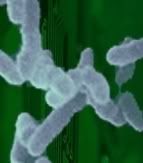
Image: "the Escherichia coli bacterium, one of the many microorganisms used in synthetic biology experiments and in bioconversion of biomass into both cellulosic ethanol as well as biohydrogen". source
I'm not a scientist, I'm a farmer, and yet I feel it is important to have a debate about the ethics of synthetic biology and its break-neck race to the biofuel future. What unexpected interactions might we expect between genomically engineered microbes and our ecosystems?
Venture capital is swarming to "cleantech" like thistle on idle plowed land. The promise is clean energy and big profits. The nextgen biofuels require an ample source of biomass and microbes designed to efficiently digest the material within their own factory cell walls. It is the sugar/synbio century that industrialists, big Ag and governments hold as the holy grail of expansion that will see us to the next boom time. In Canada, legislation was passed this spring requiring 5% ethanol in all gasoline by 2012 and has endowed clean tech foundation, the Sustainable Development Technology Centre with $1.05 billion for investments in cleantech The NextGen Biofuels Fund received $500 million of this and distributes funds to support "first-of-kind large demonstration-scale facilities for next-generation renewable fuels".
Where is the debate about the genome modified or synthetic microbes that are being designed for bioprocessing? If you read the disciple and industry websites the potential dangers are clear and the lack of regulation pertaining to Synbio, equally so. Andrew Balmer & Paul Martin Institute for Science and Society University of Nottingham in a report Social and Ethical Challenges of Synthetic Biology describes some of these concerns, for example: "One of the main aims of synthetic biology is the creation of novel genetically modified organisms (GMOs), which may have utility in the production of energy and bioremediation. However, such a prospect raises concerns about their accidental release into the environment, as by their very nature such biological machines could evolve, proliferate and produce unexpected interactions that might alter the ecosystem." If their function is to digest biomass into alcohol, is that the kind of interaction possible on accidental release into the biosphere? And if Synthetic biologists are notorious for asking not "What have you learned?" or "What do we understand?" ... but instead asking.. "What have you made?" and "How did you make it?", will the unraveling of the complexity of these synthetic organisms fall to biologists funded by the public purse, after the fact, with regulations from 1999 ?. The potential for "bio-error" as well as bio-terror" are very real. Its time to let the people in on the decisions for the future of our planet.



No comments:
Post a Comment